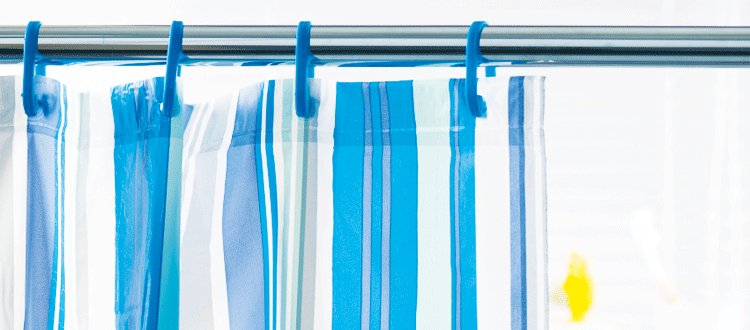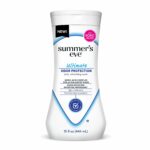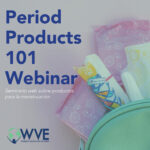Tip of the Month: Choose Fabric Shower Curtains
 |
|
Alex Scranton Director of Science |
Did you know that most vinyl shower curtains are made out of polyvinyl chloride (PVC)? PVC is often called the “poison plastic,” because it needs a lot of chemical stabilizers and plasticizers to make it useful, including toxic chemicals like phthalates and heavy metals like lead and cadmium, which are linked to reproductive and developmental problems The production of PVC is also highly toxic for the communities that live close to the manufacturing plants.
A study by our partners at CHEJ showed that PVC shower curtains can release as many as 108 volatile organic chemicals into our homes – some of them lingering for as long as 28 days after the shower curtain was unwrapped and hung in the bathroom! These chemicals have been linked to developmental damage as well as damage to the liver, central nervous system, respiratory, and reproductive systems.
And all you wanted to do was take a shower…
But don’t worry, you can opt instead for fabric shower curtains and ditch the toxic vinyl. Even big retailers now carry a range of fabric curtains to choose from.
Fabric shower curtains can be made out of cotton, polyester, rayon, or nylon. You can throw them in the wash every couple of months to keep them clean and fresh. And the best part? They won’t be off-gassing any phthalates or heavy metals that linger in your bathroom—or in your body.
Like this tip? Check out the rest of our Monthly Tips here!







what about after 28 days? do the chemicals from PVC curtains continue to off gas or is it less toxic after the first month?
thanks!
what about after 28 days? do the chemicals from PVC curtains continue to off gas or is it less toxic after the first month?
thanks!
What about PVC Free Plastic Curtains? Are there other chemicals besides PVC to avoid?
Thanks & Cheers
I tried a cotton canvas shower curtain for a long time. It constantly got moldy. The only way I found to address this was with bleach, a toxin I’d rather avoid. Which specific fabrics work the best? I believe that the nylon curtains are treated with teflon, another toxin.
Are linen curtains easy to clean? I’ve seen them selling for close to
$100, very pricey. Thanks for your guidance.
Hi,
Where can cotton shower curtains be bought at?
I am very concerned about toxins in the Home. I have made and still have a few Hemp shower curtains. Hemp is good since it doesn’t mildew . Just leave it open & let dry. My personal one is Hemp/silk . I’m a big hater of wall to wall carpets too. I don’t wear polyester so if you hear of those great new outfits from water bottles think again. Wow Someone spent a lot of money on marketing, but its the same ole crap, made from oil just like your carpets. all that stuff is petro based.
thank you for this very valuable information. There are so many facts that the public is just unaware of! Our old vinyl is out the door!
My husband just purchased a new shower curtain liner for our guest bathroom. It is from Everyday Living, mildew resistant shower curtain liner. Made in China….I don’t like that! It says for the Content: EVA. It is odorless and chloride free. Do you know what EVA means? I have a fabric curtain, but I was using a vinyl liner with it for inside the tub. The vinyl curtain was mildewed, so that is why my husband purchased a new one. I haven’t put it up yet, so I could return it. I am thinking that perhaps I could get by with only the fabric curtain. Will it keep the water from penetrating unto the floor? Will the fabric get wet and mildewed? I would like your advice. Thank you!
Good tip, thanks!
Yes, we all know that chemicals our bad for us, and we can’t always avoid them. So let’s look at the whole story instead of just one part.
Why aren’t we looking closer into our own individual health status instead of focusing only on the chemicals?
It doesn’t matter if it’s a single chemical or a mixture of low dose chemicals
Chemicals effect each individual in different ways because we are not biochemically the same. In some people these chemicals may affect their heart in others their hormones, or lungs or causing depression.
Our body is an incredible machine. If all of our organ systems are working the way they should. The body has no problem breaking these chemicals down into harmless byproducts and eliminated.
However, the problems start when our bodies are nutrient depleted from chemical toxins, poor diets, processed foods and sedentary lifestyles.
According to the World Health Organization, environmental toxins, poor diets, processed foods, and sedentary lifestyles cause chronic diseases and deplete nutrients in our body.
When the body is depleted of its nutrients it causes an alteration in the structure and function of organ system(s) and impairing our ability to remove these toxins out of our system and manifesting into signs and symptoms of chronic diseases.
Identifying our individual nutrient depletions using standard blood tests will assess the organ structure and function as well as nutrient depletions. This is vital if we want to eliminate or reverse chronic disease symptoms.
Why are there no answers to people’s questions in the comments section? I have the same questions. Why have a comments section if you’rennot going to reply to them?
Thanks for your questions Mary Lou and Alisa! We should have mentioned EVA curtains in our blog. They are a non-PVC plastic alternative – that is definitely preferable to PVC, because the plastic is not made with chlorine and does not require the toxic plasticizers like phthalates and heavy metals. They are more commonly available now than they used to be – and should be marked “EVA” somewhere on the package. So they are a good option if you feel you need a plastic liner or curtain.
Ann and Annette – your comments about mold and mildew are great feedback. It certainly depends on the climate you live in. In drier climates, fabric shower curtains can work quite well without growing mold or mildew. Yes – they do get wet, but are effective at blocking water from penetrating onto the floor. But as long as they are stretched back out across your shower curtain rod – they should air dry completely before the next day. (If they are bunched up at one end of the shower, moisture can get trapped – which can lead to mold or mildew problems over time.) The advantage is that they can be easily machine washed, which can also prevent mold from taking hold. In climates that are more humid, the curtain – especially if it’s a thick fabric, might not dry out completely overnight– and if that’s the case – you may want to look for a lighter fabric curtain or at the EVA plastic option instead.
Hannah – great question on the offgassing – it is likely that the offgassing continues even after 28 days. It’s just that the shower curtain study only lasted 28 days, so that was as far as they tested. Bottom line is that PVC curtains can harm your indoor air quality for a long time – especially in a underventilated small bathroom. Not worth it!
Dr. Hicks – thanks for your comments. Always good to step back and look from a broader perspective!
Donna – our apologies – we are thrilled to get so many comments on this blog – just took us a day to get our responses written up. We will do better next time! Happy to answer questions if you have more!
Love this tips,Fabric shower curtains at the most affordable prices and i like this post.
I heard read that plastics always releases toxins, the more it wears down, it becomes just as toxic. Just like a plastic water bottle. Some people like to reuse plastic bottles but its actually harmful because water acts like a cleansing agent inside the bottle and its always cleaning the bottle from inside the plastic bottle, making the water toxic. Drink out of glass bottles, mason jar. Do away with much plastic as you can. Curtain liners…im still searching.
Thanks for the information on the fabric shower curtains vs, the plastic curtains. Also thanks for explaining the difference between EVA and the PVC curtains. I bought the shower liners in three different materials.The liner with all the chemicals, the fabric,and the PVC, both from Tjmaxx. I’ve never used the fabric shower curtain. I always saw my grandmother (R.I.P) used the fabric shower. I asked her why she always used the fabric? She said, ” it’s better for her breathing”. She had asthma. I was more leaning towards the fabric shower curtain, more or less the plastic with the PVC. I noticed it didn’t have any chemical smell. After reading your blog, I’m definitely going to take back those plastic shower curtains that I bought. I work in health field, so I’m definitely about my health and the environment. Thank you.